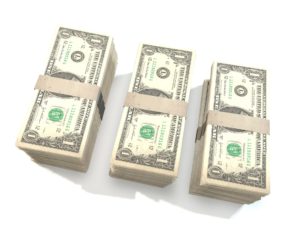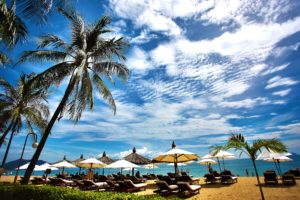As surprising as this may sound – international tourism is an export. The key to determining whether something is an import or an export is the direction the money goes, not the direction the product goes. If a Mustang is built in the US and sold in Argentina, it is an export for the US because the money comes to the US from Argentina. Similarly, if a tourist from Argentina comes to New York City, it is an export from the US because the money comes to the US from Argentina. So that means international tourism is good for the balance of trade for the country in which it happens. However, there are a great deal of other economic impacts that don’t happen at the international level. After all, the vast majority of travel that takes place in the world is domestic travel.
TAXES
 There are three taxes that are important to understanding tourism impacts: Sales tax, airport tax, and hotel bed tax. Sales tax is fairly easy to understand – when tourists travel to a destination they buy things, and those things are subject to federal, state/province, and local taxes. In many destinations, sales tax goes toward some sort of ‘general’ fund that can be used for all sorts of different things in the community. Tourists paying sales tax is generally positive for communities because they pay sales tax without using the things that taxes generally pay for (libraries, roads, utilities, etc.), so there is a net positive benefit. Airport tax is usually paid as part of an overall ticket price. Certain airports have much higher taxes than others. Airport taxes pay for various things – in most cases, they pay for upkeep at the airport as well as any regulatory organization that covers the airspace around the airport. Hotel bed tax is probably the tax you’re most familiar with. Bed tax can be levied by multiple levels of government, and in most places you’ll pay a few different taxes all rolled in to one fee. Where I live in Phoenix, we have a combined tax of 12.57% including city, county, and state bed taxes – which is fairly average. Depending on the place, hotel bed tax can be used to fund various things, including being paid into a city/county/state general fund. However, in many destinations, the hotel bed tax contributes to local Destination Management Organizations (DMOs), which function as a research, management, and marketing organization for the destination. Ever seen a “What happens in Vegas stays in Vegas” commercial? Those are the types of clever marketing materials that DMOs often produce.
There are three taxes that are important to understanding tourism impacts: Sales tax, airport tax, and hotel bed tax. Sales tax is fairly easy to understand – when tourists travel to a destination they buy things, and those things are subject to federal, state/province, and local taxes. In many destinations, sales tax goes toward some sort of ‘general’ fund that can be used for all sorts of different things in the community. Tourists paying sales tax is generally positive for communities because they pay sales tax without using the things that taxes generally pay for (libraries, roads, utilities, etc.), so there is a net positive benefit. Airport tax is usually paid as part of an overall ticket price. Certain airports have much higher taxes than others. Airport taxes pay for various things – in most cases, they pay for upkeep at the airport as well as any regulatory organization that covers the airspace around the airport. Hotel bed tax is probably the tax you’re most familiar with. Bed tax can be levied by multiple levels of government, and in most places you’ll pay a few different taxes all rolled in to one fee. Where I live in Phoenix, we have a combined tax of 12.57% including city, county, and state bed taxes – which is fairly average. Depending on the place, hotel bed tax can be used to fund various things, including being paid into a city/county/state general fund. However, in many destinations, the hotel bed tax contributes to local Destination Management Organizations (DMOs), which function as a research, management, and marketing organization for the destination. Ever seen a “What happens in Vegas stays in Vegas” commercial? Those are the types of clever marketing materials that DMOs often produce.
FOREIGN EXCHANGE
 This category of economic impacts is only important at the international level. As tourism is an export, it is one important way that countries gain things like foreign currencies, which can be especially important for developing countries who’s currencies are not quite as stable. Foreign currencies can then be used to purchase non-tourism goods and services that the country may not be able to produce itself. This means that tourism is a positive marker on a country’s international balance of payments. Most countries strive to have a net gain in terms of international balance of payments, meaning they export products and services of greater value than they import – this is one sign of an overall healthy economy. However, for most places (including the United States, which had a-$416 billion USD international balance of payments in 2016 according to the World Bank), it is not possible to accomplish a net gain (Coincidentally, China’s international balance of payments in 2016 was +$196 billion USD).
This category of economic impacts is only important at the international level. As tourism is an export, it is one important way that countries gain things like foreign currencies, which can be especially important for developing countries who’s currencies are not quite as stable. Foreign currencies can then be used to purchase non-tourism goods and services that the country may not be able to produce itself. This means that tourism is a positive marker on a country’s international balance of payments. Most countries strive to have a net gain in terms of international balance of payments, meaning they export products and services of greater value than they import – this is one sign of an overall healthy economy. However, for most places (including the United States, which had a-$416 billion USD international balance of payments in 2016 according to the World Bank), it is not possible to accomplish a net gain (Coincidentally, China’s international balance of payments in 2016 was +$196 billion USD).
EMPLOYMENT & INCOME
 Employment and income are the most commonly referenced economic impact of tourism, especially when destinations are considering tourism development. It’s true that tourism does provide a great deal of employment and income in many tourism destinations. However, in many cases a disproportionate number of jobs in the tourism industry are low paying and therefore may not be as good as alternative employment opportunities that could be developed if not for a focus on tourism. There are two types of employment that should be considered: direct and indirect. Direct employment involves work at companies that are in contact with tourists and provide the tourism experience (e.g., Hotels, restaurants, airlines, cruise lines, resorts, etc.). Indirect employment involves organizations that provide goods and services to direct businesses (e.g., Aircraft manufacturers, restaurant food suppliers, hotel construction firms, mattress manufacturers). Individuals at those organizations aren’t necessarily deriving all of their income because of tourism, but at least some portion comes from their involvement in the tourism industry.
Employment and income are the most commonly referenced economic impact of tourism, especially when destinations are considering tourism development. It’s true that tourism does provide a great deal of employment and income in many tourism destinations. However, in many cases a disproportionate number of jobs in the tourism industry are low paying and therefore may not be as good as alternative employment opportunities that could be developed if not for a focus on tourism. There are two types of employment that should be considered: direct and indirect. Direct employment involves work at companies that are in contact with tourists and provide the tourism experience (e.g., Hotels, restaurants, airlines, cruise lines, resorts, etc.). Indirect employment involves organizations that provide goods and services to direct businesses (e.g., Aircraft manufacturers, restaurant food suppliers, hotel construction firms, mattress manufacturers). Individuals at those organizations aren’t necessarily deriving all of their income because of tourism, but at least some portion comes from their involvement in the tourism industry.
THE MULTIPLIER EFFECT
 When considering income gained from employment either directly or indirectly by the tourism industry, the impact that income has on the local economy is often a function of something called the multiplier effect. The multiplier effect refers to when an individual who is either directly or indirectly employed by the tourism industry receives their paycheck, and then spends that money they made in the local economy. Economies that are more closed (meaning most of the goods and services are produced locally), multipliers tend to be higher, as the money that is injected into the community is recycled repeatedly within the same economy. For example – a bartender at a restaurant gets their paycheck and pays rent to their local landowner, buys groceries at a local grocery store, and gets guitar lessons from a local artist. Those individuals then spend their money within the local economy and so on and so forth. Economies that are very open (think globalization) tend to have low multipliers because individuals can spend their money on all sorts of goods and services being produced across the globe (I’m looking at you, Amazon!). This phenomenon is known as leakage. In almost every economy, the money spent by tourists leaks out eventually, but the injection of cash from elsewhere into the local economy is a positive economic impact for some period of time.
When considering income gained from employment either directly or indirectly by the tourism industry, the impact that income has on the local economy is often a function of something called the multiplier effect. The multiplier effect refers to when an individual who is either directly or indirectly employed by the tourism industry receives their paycheck, and then spends that money they made in the local economy. Economies that are more closed (meaning most of the goods and services are produced locally), multipliers tend to be higher, as the money that is injected into the community is recycled repeatedly within the same economy. For example – a bartender at a restaurant gets their paycheck and pays rent to their local landowner, buys groceries at a local grocery store, and gets guitar lessons from a local artist. Those individuals then spend their money within the local economy and so on and so forth. Economies that are very open (think globalization) tend to have low multipliers because individuals can spend their money on all sorts of goods and services being produced across the globe (I’m looking at you, Amazon!). This phenomenon is known as leakage. In almost every economy, the money spent by tourists leaks out eventually, but the injection of cash from elsewhere into the local economy is a positive economic impact for some period of time.
INCREASED COST OF LIVING
 One of the economic benefits of tourism can lead to one of the major drawbacks – increased cost of living. While more tax dollars, jobs, and income certainly can lead to higher quality of life, it can also drive up the price of real estate, rent, property taxes, and the cost of goods and services. This is especially common in places that go from no tourism to a lot of tourism in a short period of time. While those who already own homes may view the increase in property values to be positive, the additional property taxes that come with it can price some people out of the neighborhood. In addition, tourism organizations (and increasingly those looking to buy homes to rent as short term vacation rentals) are willing to pay quite a bit more money than other purchasers. In terms of the cost of goods and services, the simple act of providing things to tourists can often be enough to raise prices, as tourists are likely willing to pay more than locals. Some destinations have evolved informal systems of providing lower prices to locals (like Kama’aina prices in Hawaii), but this practice is certainly not the standard throughout the world.
One of the economic benefits of tourism can lead to one of the major drawbacks – increased cost of living. While more tax dollars, jobs, and income certainly can lead to higher quality of life, it can also drive up the price of real estate, rent, property taxes, and the cost of goods and services. This is especially common in places that go from no tourism to a lot of tourism in a short period of time. While those who already own homes may view the increase in property values to be positive, the additional property taxes that come with it can price some people out of the neighborhood. In addition, tourism organizations (and increasingly those looking to buy homes to rent as short term vacation rentals) are willing to pay quite a bit more money than other purchasers. In terms of the cost of goods and services, the simple act of providing things to tourists can often be enough to raise prices, as tourists are likely willing to pay more than locals. Some destinations have evolved informal systems of providing lower prices to locals (like Kama’aina prices in Hawaii), but this practice is certainly not the standard throughout the world.
OVER-RELIANCE ON TOURISM
 Probably the biggest negative economic impact that tourism can have on an economy is an over-reliance issue. For many destinations (especially those in developing countries with typical tourism resources like mountains, sand, sea, and sun), tourism is an attractive industry to develop because it can be developed fairly quickly, is labor intensive, and does not require intensive training of workers. All of these things can quickly lead to an economy that is heavily reliant on tourism. In good times, these places can do exceptionally well. Unfortunately, tourism demand can be fickle (destinations rise and fall in popularity based on taste, what is hot, and which celebrities have posted pictures from there on Instagram, just to name a few). Tourism is also subject to all sorts of disasters including, natural disasters, terrorism, and economic recession. In the case of economic recession, tourism is one of the most heavily impacted industries, as people tend to cut back on ‘leisure’ expenses first, instead focusing on making their payments on their houses, cars, food, etc. In economies that are heavily reliant on tourism, quick changes in demand can mean things go bad quickly – people being laid off, wages going down, etc.
Probably the biggest negative economic impact that tourism can have on an economy is an over-reliance issue. For many destinations (especially those in developing countries with typical tourism resources like mountains, sand, sea, and sun), tourism is an attractive industry to develop because it can be developed fairly quickly, is labor intensive, and does not require intensive training of workers. All of these things can quickly lead to an economy that is heavily reliant on tourism. In good times, these places can do exceptionally well. Unfortunately, tourism demand can be fickle (destinations rise and fall in popularity based on taste, what is hot, and which celebrities have posted pictures from there on Instagram, just to name a few). Tourism is also subject to all sorts of disasters including, natural disasters, terrorism, and economic recession. In the case of economic recession, tourism is one of the most heavily impacted industries, as people tend to cut back on ‘leisure’ expenses first, instead focusing on making their payments on their houses, cars, food, etc. In economies that are heavily reliant on tourism, quick changes in demand can mean things go bad quickly – people being laid off, wages going down, etc.
Continue on to sociocultural impacts or environmental impacts to learn more!
